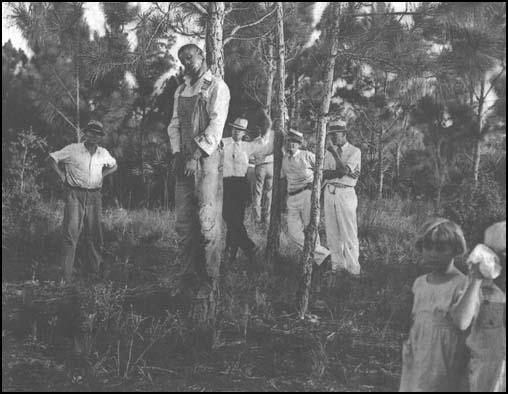Rubin Stacy
The NAACP hoped that the election of Franklin D. Roosevelt in 1932 would bring an end to lynching. Two African American campaigners against lynching, Mary McLeod Bethune and Walter Francis White, had been involved in helping Roosevelt to obtain victory. His wife, Eleanor Roosevelt, had also been a long-time opponent of lynching.
In 1935 attempts were made to persuade Franklin D. Roosevelt to support a Anti-Lynching bill that had been introduced into Congress. However, Roosevelt refused to speak out in favour of the bill that would punish sheriffs who failed to protect their prisoners from lynch mobs. He argued that the white voters in the South would never forgive him if he supported the bill and he would therefore lose the next election.
Even the appearance in the newspapers of the lynching of Rubin Stacy failed to change Roosevelt's mind on the subject. Six deputies were escorting Stacy to Dade County jail in Miami on 19th July, 1935, when he was taken by a white mob and hanged by the side of the home of Marion Jones, the woman who had made the original complaint against him. The New York Times later revealed that "subsequent investigation revealed that Stacy, a homeless tenant farmer, had gone to the house to ask for food; the woman became frightened and screamed when she saw Stacy's face."

Primary Sources
(1) Roger Rosenblatt, Confronting the Past (17th February, 2000)
That ordinary people did these things is deeply disturbing; that they manufactured a social rationale for their acts is more disturbing still. Look for a while at the picture of the lynching of Rubin Stacy, Fort Lauderdale, Florida, 1930. Look first at Stacy, then turn to the little girl in the summer dress, looking at Stacy, and then to the man behind her, perhaps her father, in the spotless white shirt and slacks and the clean white skimmer. They will stand there forever, admiring the proof of their civilization.
(2) Abel Meeropol wrote the poem Strange Fruit, after seeing a photograph of the lynching of Thomas Shipp and Abram Smith. Meeropol, a member of the American Communist Party, published the poem in the Marxist journal, New Masses, in 1939.
Southern trees bear a strange fruit,
Blood on the leaves and blood at the root,
Black body swinging in the Southern breeze,
Strange fruit hanging from the poplar trees.
Pastoral scene of the gallant South,
The bulging eyes and the twisted mouth,
Scent of magnolia sweet and fresh,
And the sudden smell of burning flesh!
Here is a fruit for the crows to pluck,
For the rain to gather, for the wind to suck,
For the sun to rot, for a tree to drop,
Here is a strange and bitter crop.
(3) African Americans lynched in 1935.
Jerome Wilson, Franklington, Kentucky (January 11 1935)
Anderson Ward, Maringuoin, Louisiana (March 3 1935)
Abe Young, Slayden, Mississippi (March 12 1935)
Daughter of Rev. A. B. Brookins, Poinsett, Arkansas (March 21 1935)
Rev. T. A. Allen, Hernando, Mississippi (March 21 1935)
Mary Green, Mississippi County, Arkansas (March 22 1935)
R. J. Tyrone, Lawrence, Mississippi (March 25 1935)
Unidentified African American, Hernando, Mississippi (March 28 1935)
R. D. McGee, Wiggins, Mississippi (June 22 1935)
Dooley Morton, Columbus, Mississippi (July 15 1935)
Bert Moore, Columbus, Mississippi (July 15 1935)
Reuben Stacy, Fort Lauderdale, Florida (July 19 1935)
Govan Ward, Louisburg, North Carolina (August 3 1935)
Bodie Bates, Pittsboro, Mississippi (August 5 1935)
Elwood Higgenbotham, Oxford, Mississippi (September 17 1935)
Lewis Harris, Vienna, Georgia (September 28 1935)
Bo Bronson, Moultrie, Georgia (October 17 1935)
2 unidentified African Americans, Gretna, Louisiana (November 1 1935)
Baxter Bell, White Bluff, Tennessee (November 4 1935)
Ernest Collins, Columbus, Texas (November 11 1935)
